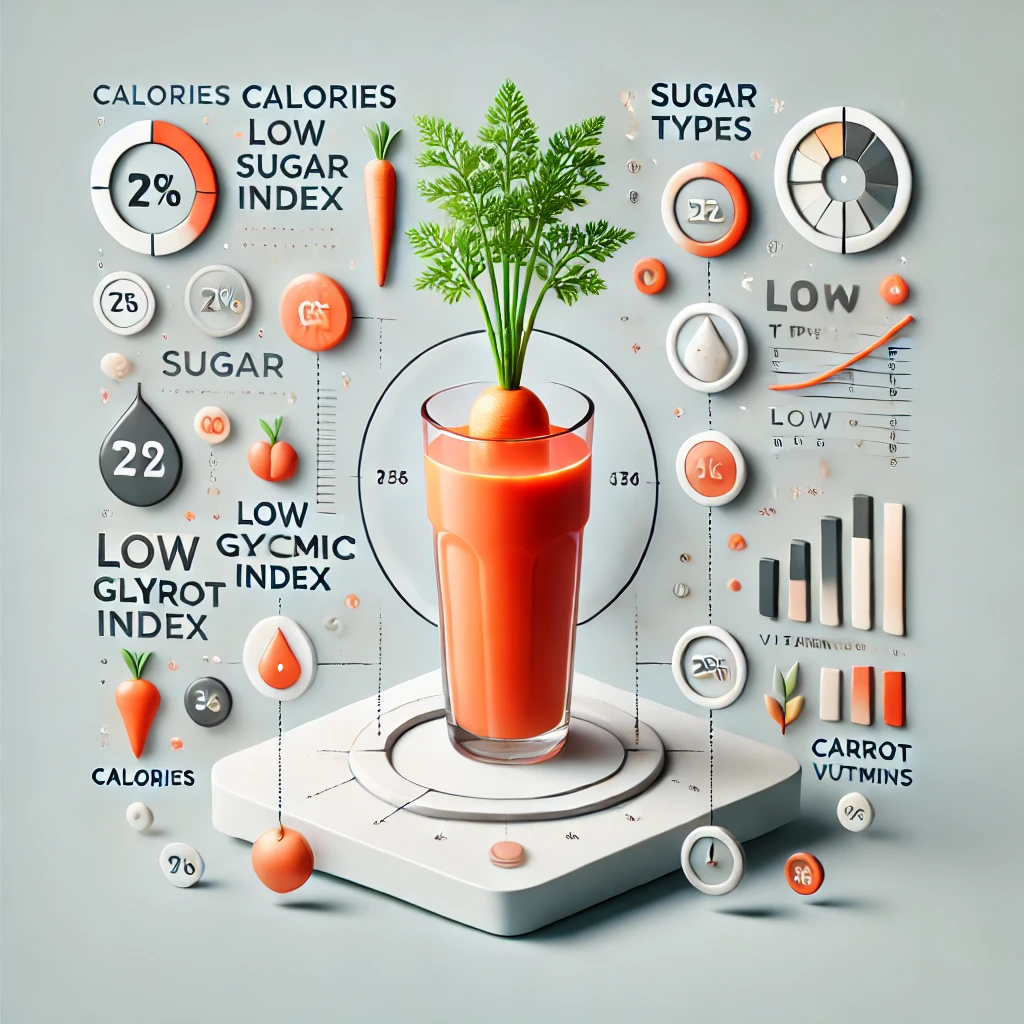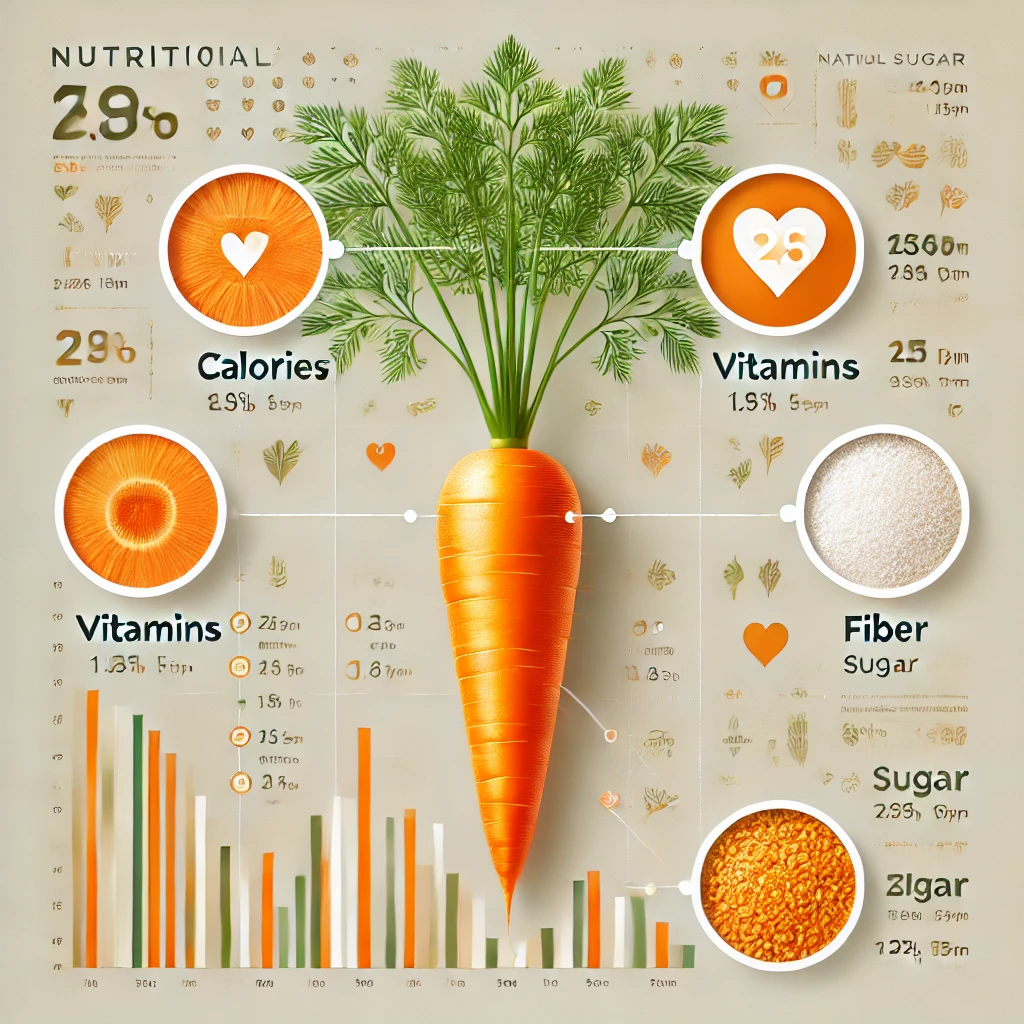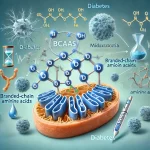Carrots are low-calorie vegetables, making them a popular choice for healthy eating. A single medium-sized carrot (61 grams) contains approximately 25 calories, while a cup of chopped carrots (122 grams) contains around 50 calories. This low-calorie count, combined with their nutritional value, makes carrots an excellent snack or meal addition.
Vitamins and Nutritional Components of Carrots
Carrots are packed with essential vitamins and minerals. Here’s what they contain:
| Nutrient | Amount (per 100g) | Benefits |
|---|---|---|
| Vitamin A | 835 mcg | Boosts vision and immune system |
| Vitamin K | 13.2 mcg | Aids blood clotting and bone health |
| Vitamin C | 5.9 mg | Supports immunity and skin health |
| Fiber | 2.8 g | Improves digestion |
| Potassium | 320 mg | Regulates blood pressure and hydration |
Carrots also contain antioxidants such as beta-carotene, lutein, and zeaxanthin, which protect against cell damage.

Benefits of Carrots
- Improves Vision: High levels of beta-carotene (converted to vitamin A) enhance night and overall vision.
- Promotes Skin Health: Antioxidants and vitamin C improve skin texture and prevent aging.
- Boosts Heart Health: Potassium and fiber help regulate blood pressure and cholesterol.
- Supports Weight Loss: Low in calories and high in fiber, carrots keep you full longer.
- Enhances Immunity: Vitamin A and antioxidants strengthen the immune system.
Cons of Eating Carrots
- Carotenemia Risk: Excessive carrot consumption can turn the skin yellowish due to beta-carotene.
- High Natural Sugars: Carrots have more sugar than some vegetables, which could impact blood sugar levels in large amounts.
- Digestive Issues: Eating too many raw carrots may cause bloating or gas in sensitive individuals.
- Allergic Reactions: Rarely, some people may experience oral allergy syndrome.
- Pesticide Residues: Non-organic carrots may have pesticide residues if not washed properly.
Carrot Sugar and Its Difference from Glucose and Lactose
Carrots contain sucrose, a natural sugar that gives them their sweetness. Unlike glucose (a simple sugar) and lactose (a sugar found in milk), sucrose is a disaccharide composed of glucose and fructose.
| Type of Sugar | Source | Structure | Impact on Blood Sugar |
|---|---|---|---|
| Sucrose | Carrots, fruits | Disaccharide | Moderate (due to fiber content) |
| Glucose | Starchy foods | Monosaccharide | High (quick spike in blood sugar) |
| Lactose | Milk products | Disaccharide | Low to moderate |

How Carrot Sugar Acts
The fiber in carrots slows down the absorption of sucrose, leading to a gradual rise in blood sugar levels. This is why carrots have a low glycemic index (GI), making them suitable for diabetics and those looking to maintain steady energy levels.
Why Carrot Sugar is Good
- Low Glycemic Impact: Carrots provide steady energy without sudden sugar spikes.
- Natural Sweetness: Contains no added sugars, making them healthier than processed snacks.
- Rich in Nutrients: Offers vitamins and fiber alongside natural sugars.
- Supports Weight Loss: Low-calorie and nutrient-dense.
- Heart-Friendly: Doesn’t overload the body with glucose, reducing heart stress.
How Much Carrot to Eat Daily Based on Workouts
| Workout Type | Carrot Intake (per day) | Reason |
|---|---|---|
| Light activity (walking) | 1–2 medium carrots | Provides energy and nutrients |
| Moderate exercise (yoga) | 2–3 medium carrots | Boosts endurance and recovery |
| Intense workouts (HIIT) | 3–4 medium carrots | Replenishes energy and antioxidants |
Is Carrot Juice Healthy?
Carrot juice is nutrient-dense but lacks the fiber found in whole carrots. A single glass of carrot juice can contain the vitamins of 2–3 carrots but with concentrated sugars.
Benefits of Carrot Juice
- Nutrient Boost: High concentration of vitamins and minerals.
- Easily Digestible: Great for people with sensitive digestion.
- Improves Skin and Vision: Vitamin A and antioxidants are more bioavailable.
- Hydration: Refreshing and hydrating due to its water content.
- Energy Source: Quick source of natural energy.
Cons of Carrot Juice
- High Sugar Content: Lacks fiber, leading to quicker blood sugar spikes.
- Overconsumption Risk: Can lead to carotenemia.
- Calorie Concentration: Higher calories compared to eating whole carrots.
- Expensive: Requires multiple carrots per glass.
- Nutrient Loss: Processing can reduce vitamin content.
Meta Description
“Explore the calories, vitamins, and health benefits of carrots and carrot juice. Learn about their natural sugars, daily intake recommendations, and effects on workouts. Discover the pros and cons of incorporating carrots into your diet.”









